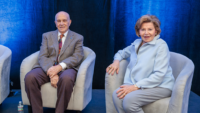Philanthropists boost Virginia universities, health systems
Virginia universities and health systems received major philanthropic gifts in 2025, including multimillion-dollar donations to support scholarships, programs, and health initiatives.
U.Va. Wise receives largest ever donation
The University of Virginia’s College at Wise has received its largest ever donation, $11.2 million, from The Bill Gatton Foundation, the Wise County college announced Monday. The late Carol Martin “Bill” Gatton, a successful businessman who owned the Gatton Automotive Group with dealerships in Kentucky and Tennessee, made significant gifts to the University of Kentucky […]
Inova raises $83M to match Schars’ $75M gift
Inova Health System has raised $83 million over the past year, surpassing the “Schar Challenge” issued by donors Dwight and Martha Schar when they made a $75 million matching gift to Inova in May 2023. The Schars’ most recent gift to support Inova’s heart and vascular services and the gifts to match it made by […]
Lego donates $1M to six Richmond-area nonprofits
Lego Group has distributed $1 million in grants across six Richmond region nonprofits, the Danish toymaker announced Thursday. The company, which broke ground in April on its $1 billion manufacturing facility in Chesterfield County, awarded the funding to organizations serving children and families as part of its commitment to help kids “learn through play.” “Today […]
Donations by individuals and family foundations
Read more: Mannings aim for biotech revolution with $100 million gift Check the numbers: Donations by companies and corporate foundations; total corporate donations
Total corporate donations
Check the numbers: Donations by companies and corporate foundations; donations by individuals and family foundations Read more: Mannings aim for biotech revolution with $100 million gift
Lego breaks ground on $1B Chesterfield facility
The Lego Group broke ground Thursday on its $1 billion Chesterfield County manufacturing facility — launching the Danish toymaker’s first U.S. manufacturing plant and one of Virginia’s biggest economic development projects. The Billund, Denmark-based toy company known for its brightly colored plastic toy bricks and construction sets plans to hire 1,761 people to work at […]
Goodwill of the Valleys names philanthropy exec
Donna Stucker is the new chief philanthropy officer for Goodwill Industries of the Valleys. Stucker assumed her role April 3, according to a news release. She will lead a new capital campaign and associated donor development and will plan and manage an effort to grow donations for the Roanoke-based Goodwill chapter, which serves 35 counties […]
JMU fundraising campaign brings in $251M
James Madison University‘s second comprehensive fundraising campaign, Unleashed, raised more than $251 million, the Harrisonburg university announced Friday. The eight-year fundraising campaign, which exceeded its $200 million goal in March 2021, ended June 30. It began with an advanced gift phase in July 2014 before JMU announced it publicly in October 2018. Unleashed attracted 63,976 [&hel[...]
U.Va. School of Nursing receives $14M donation
The Carlyle Group co-founder, interim CEO and non-executive co-chairman William E. “Bill” Conway Jr. and his wife, Joanne, have committed $14 million to the University of Virginia‘s School of Nursing, the university announced Friday. Adding to previous donations, the Conways’ gifts now total $49 million. “Our goal of supporting the School of Nursing is twofold,” [&helli[...]
U.Va. hits $4B in capital campaign
The University of Virginia has hit its $4 billion benchmark in its $5 billion Honor the Future capital campaign three years ahead of its deadline, the university announced this week. U.Va. has brought in significant individual donations during the fundraising campaign, including a record-breaking $120 million gift from alumni Jaffray and Merrill Woodriff in 2019, […]
Norfolk Southern donates archives to museum
Atlanta-based Norfolk Southern Corp. donated its complete collection of historical documents and archives from Norfolk and Western Railway, its predecessor, to the Virginia Museum of History & Culture, the company announced last week. Norfolk Southern, formerly headquartered in Norfolk, also provided a $750,000 grant to help the museum digitize, catalog and preserve the collection, and [&helli[...]





















